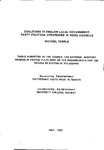COALITIONS IN ENGLISH LOCAL GOVERNMENT: PARTY POLITICAL STRATEGIES IN HUNG COUNCILS
| dc.contributor.author | TEMPLE, MICHAEL | |
| dc.contributor.other | Faculty of Arts, Humanities and Business | en_US |
| dc.date.accessioned | 2013-09-18T10:38:00Z | |
| dc.date.available | 2013-09-18T10:38:00Z | |
| dc.date.issued | 1992 | |
| dc.identifier | NOT AVAILABLE | en_US |
| dc.identifier.uri | http://hdl.handle.net/10026.1/1837 | |
| dc.description.abstract |
This work takes a multi-method approach to the study of hung English councils. Insights and suppositions from a variety of approaches are utilised, including formal coalition theory and case studies of local authorities. A major aim of the thesis is to analyse questionnaire and case study data which will further improve our understanding of coalitional activity. Although the primary purpose is to inform the student of hung councils, formal coalition theories are also tested. This study provides the first clear evidence that elected political elites lose power to the body of councillors in most hung councils. However, the power of the bureaucratic elite, unlike their political counterparts, appears to remain relatively constant. Contrary to previous proposals, decision making is not characterised by uncertainty and confusion; a learning process takes place in hung councils, and the views of participants become more favourable over time. The influence of the centre party is a recurring theme of the study. Whether payoffs are office or policy, the Liberal Democrats are the primary beneficiary in hung English councils. Their commitment to a more open form of decision making and willingness to bargain with other parties may be contributing reasons for their success, but it is their ideological position in the middle of the two main parties which is offered as the primary reason for the influence they wield. None of the formal theories of coalition formation and duration perform well in predictive terms. Overall, the most accurate prediction of administrative formation would posit a minority administration formed by the largest party group, although majority coalitions are becoming more prevalent. Contrary to expectations, minority administrations are also more durable than coalitions. The large number of minority administrations demonstrates that not all politicians are 'office-driven', and that policy pay-offs are crucial. Policy closeness appears to be a greater influence on duration than either ideological connectedness or coalition size. | en_US |
| dc.description.sponsorship | UNIVERSITY COLLEGE, GALWAY | en_US |
| dc.language.iso | en | en_US |
| dc.publisher | University of Plymouth | en_US |
| dc.title | COALITIONS IN ENGLISH LOCAL GOVERNMENT: PARTY POLITICAL STRATEGIES IN HUNG COUNCILS | en_US |
| dc.type | Thesis | |
| plymouth.version | Full version | en_US |
| dc.identifier.doi | http://dx.doi.org/10.24382/4226 | |
| dc.identifier.doi | http://dx.doi.org/10.24382/4226 |
Files in this item
This item appears in the following Collection(s)
-
01 Research Theses Main Collection
Research Theses Main


